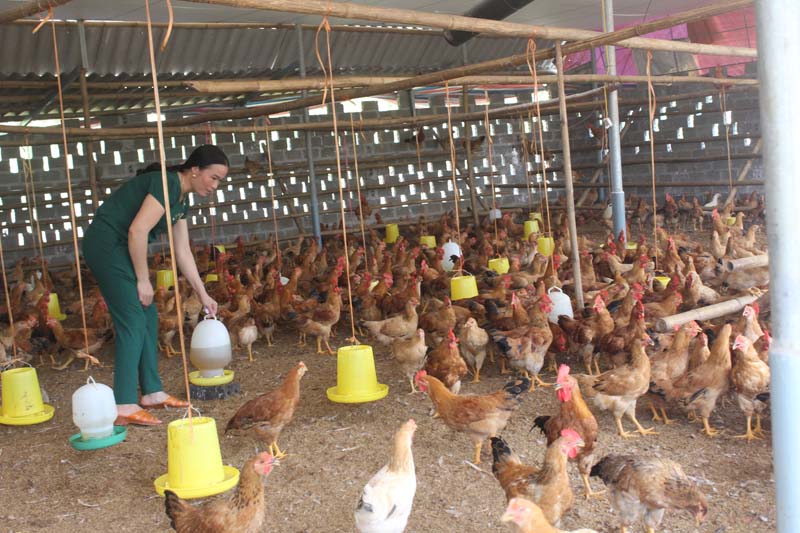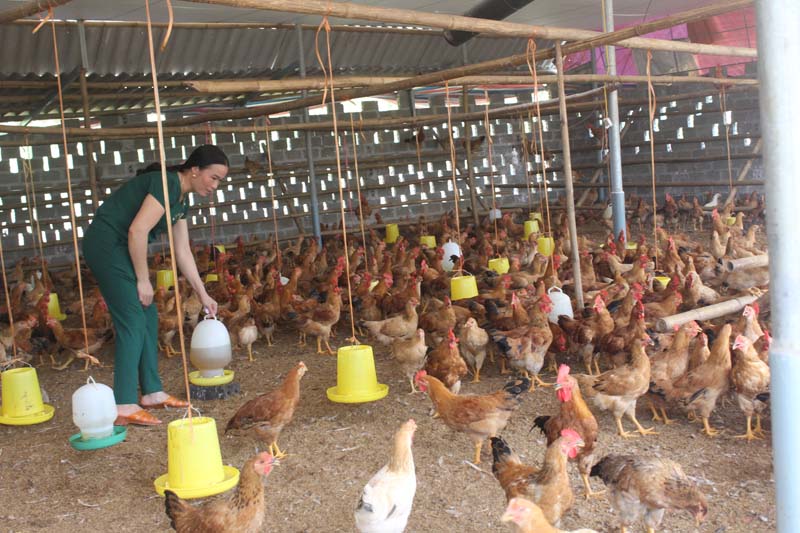
(HBO) - Ms. Quach Thi Hoa in Bung Village, Huong Nhuong Commune (Lac Son) has laid the foundation for Huong Nhuong Hill Chicken Cooperative, creating linkages in production among households and solving problems of breeding, food as well as the output for the products.

Ms. Quach Thi Hoa, Director of Hương Nhượng Hill Chicken
Cooperative is caring commercial chickens.
From 2015, her family invested 100 million
VND to build a breeding facility of 300 m2 and expanded chicken husbandary to
3,000-4,000 chicken per year. Ms. Hoa's family also had chickens hatched to
provide seeding for the households in the same village. Currently, with an area
of nearly 1 hectare, her family has just invested to build a farm to raise
chicken and grows 400 citrus fruits in the third year. According to
calculations, the income from chicken raising reaches at 80 million VND / year.
From November 2016, Huong Nhuong Hill Chicken
Cooperative was officially established by Ms. Quach Thi Hoa as the Director.
In 2017, the Cooperative was selected to
participate in the project of chicken production linkage in the value chain
under the program of New Rural Construction. The project has supported the
Cooperative with 8,000 seeding chickens, supporting training courses of
transferring science and technology to households raising commercial chickens;
supporting to buy drugs, vaccines, balloon covers, feed trays, water bottles
and construction of slaughter and preservation of chickens. The total funding
is 300 million VND. The Cooperative currently has 16 members. All members of
the Cooperative are households who are raising poultry and growing plants in
the commune. Despite newly establishment but with effective development
strategy, in 2017, the revenue of the Cooperatives reached at 2, 9 billion VND,
the profit was 600 million VND. At present, the Cooperative maintains two main
production lines of husbandry and cultivation. Ms. Hoa not only performs well
the position of Director of the Cooperative but also promotes well the role of
the leader of the Savings & Loans Group of Bung village. Her Savings &
Loans Group has 48 members with outstanding debts of more than 1 billion VND,
especially no overdue debt. In 2017, Ms. Hoa registered to borrow preferential
loans from the Social Policy Bank with a capital of 300 million VND for 9
member households to invest in chicken raising and all these households have
effectively promoted the loans. .
According to data from the Hoa Binh Provincial Party Committee, the industrial production index for the first six months of 2025 is estimated to have increased by 20% compared to the same period last year. This marks the highest year-on-year growth rate for this period since 2020.
In the first six months of 2025, Hoa Binh province’s export turnover was estimated at 1.145 billion USD, marking an 18.11% increase compared to the same period in 2024. Import turnover was estimated at $ 804 million, a 17.15% increase, which helped the province maintain a positive trade balance.
The lives of the ethnic minority farmers in Tan Lac district have gradually improved thanks to the new directions in agricultural production. This is a testament to the collective strength fostered through the professional associations and groups implemented by various levels of the district’s Farmers’ Union.
With the motto the "product quality comes first,” after nearly one year of establishment and operation, Muong village’s Clean Food Agricultural and Commercial Cooperative, located in Cau Hamlet, Hung Son Commune (Kim Boi district), has launched reputable, high-quality agricultural products to the market that are well-received by consumers. The products such as Muong village’s pork sausage, salt-cured chicken, and salt-cured pork hocks have gradually carved out a place in the market and they are on the path to obtaining the OCOP certification.
In the past, the phrase "bumper harvest, rock-bottom prices" was a familiar refrain for Vietnamese farmers engaged in fragmented, small-scale agriculture. But today, a new spirit is emerging across rural areas of Hoa Binh province - one of collaboration, organisation, and collective economic models that provide a stable foundation for production.
Maintaining growing area codes and packing facility codes in accordance with regulations is a mandatory requirement for agricultural products to be eligible for export. Recently, the Department of Agriculture and Environment of Hoa Binh province has intensified technical supervision of designated farming areas and packing facilities to safeguard the "green passport" that enables its products to access international markets.



